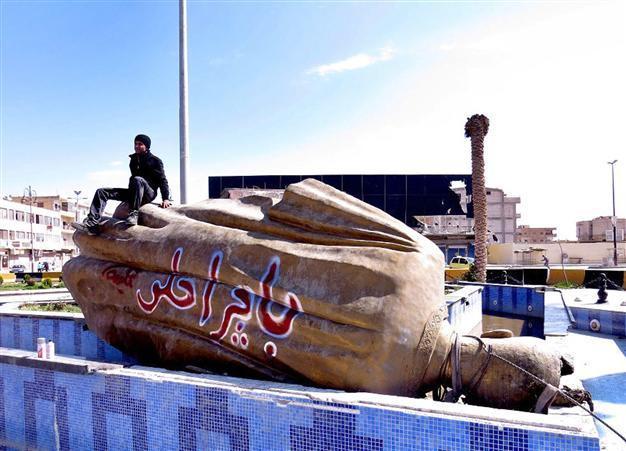UN chemical weapons team in Turkey to investigate Syria claims
AMSTERDAM/ANKARA - Reuters

Syrian man sitting on a fallen statue of former President Hafez al-Assad in this photo. UN expert leading a probe into allegations of chemical use in Syria. AP photo
U.N.-appointed inspectors, blocked from entering Syria, came to Turkey to gather information about possible use of chemical weapons in the civil war, officials said today.Members of the team assembled by U.N. Secretary-General Ban Ki-moon had been on standby in Cyprus since April, unable to enter Syria as Western governments accused President Bashar al-Assad’s forces of chemical weapons attacks. They were sent to Turkey this week and its head, Swedish scientist Ake Sellstrom, met with Turkish Foreign Minister Ahmet Davutoğlu yesterday, a senior Turkish official said.
The Syrian government and rebels fighting it have accused each other of using lethal chemical agents, including sarin gas, in the two-year-old conflict. The al-Assad regime had asked for a U.N. investigation after accusing rebels of using chemical arms in the 27-month-long conflict that, according to activists, has left 100,000 dead. However, it has refused to give access to Sellstrom and his experts after Ban Ki-moon insisted that all alleged attacks be probed. Al-Assad’s government has rejected as lies assertions by the United States, Britain and France that its forces have used chemical weapons several times against Syrian citizens. It said the claims were an attempt to justify foreign military intervention.
Western governments have grown frustrated that the U.N. mission has been unable to make progress on investigating the claims, a diplomat said. From Turkey, the team will be unable to gather soil samples or scientific evidence needed to prove chemical use, but could compile intelligence and interview or take blood samples from witnesses or victims of alleged attacks.
“As he cannot travel to Syria, Sellstrom visits countries like Turkey, France and Britain that have some information about possible use of chemical weapons in Syria,” said the Turkish official, who spoke on condition of anonymity. Sellstrom visited the Turkey-Syria border area and talked to officials who shared data on chemical weapons use, he said.
‘Anyone with a heart’ wants to help rebels
In a separate development, German Chancellor Angela Merkel yesterday said “anyone with a heart” could understand Western countries wanting to help Syrian rebels with weapon shipments, but reiterated that Berlin would not participate in the risky endeavor. “The hardship of the people of Syria is immeasurably great, their situation is unbearable,” Merkel said.
“In this desperate situation, surely each of us can understand that our friends and partners the U.S., Britain and France are considering helping parts of the Syrian opposition with weapons shipments,” she said.
“Whether this approach can succeed is an entirely different question,” she told Parliament. “The risks, in my view, would be almost impossible to assess,” she said, amid debate whether more arms would only fuel the bloodshed and weapons could fall into extremists’ hands.
The chancellor reiterated that at a G8 summit in Northern Ireland this month, “I made it unmistakably clear that Germany for legal reasons sends no weapons into civil war zones, including Syria. But I have also made it unmistakably clear that Germany will continue to do everything in its power to help the people of Syria out of the disaster,” citing the more than 360 million euros Berlin had already committed in humanitarian aid.
















